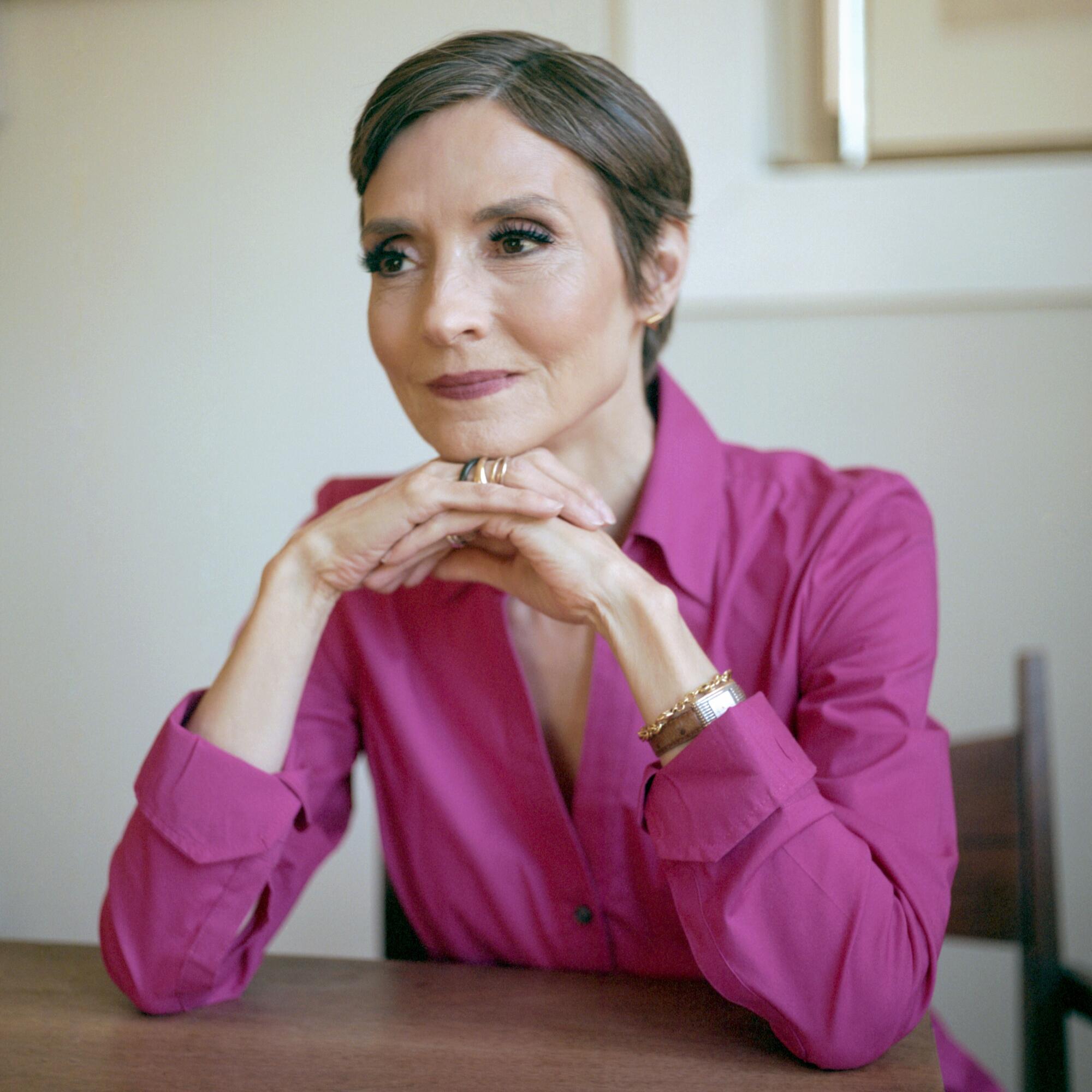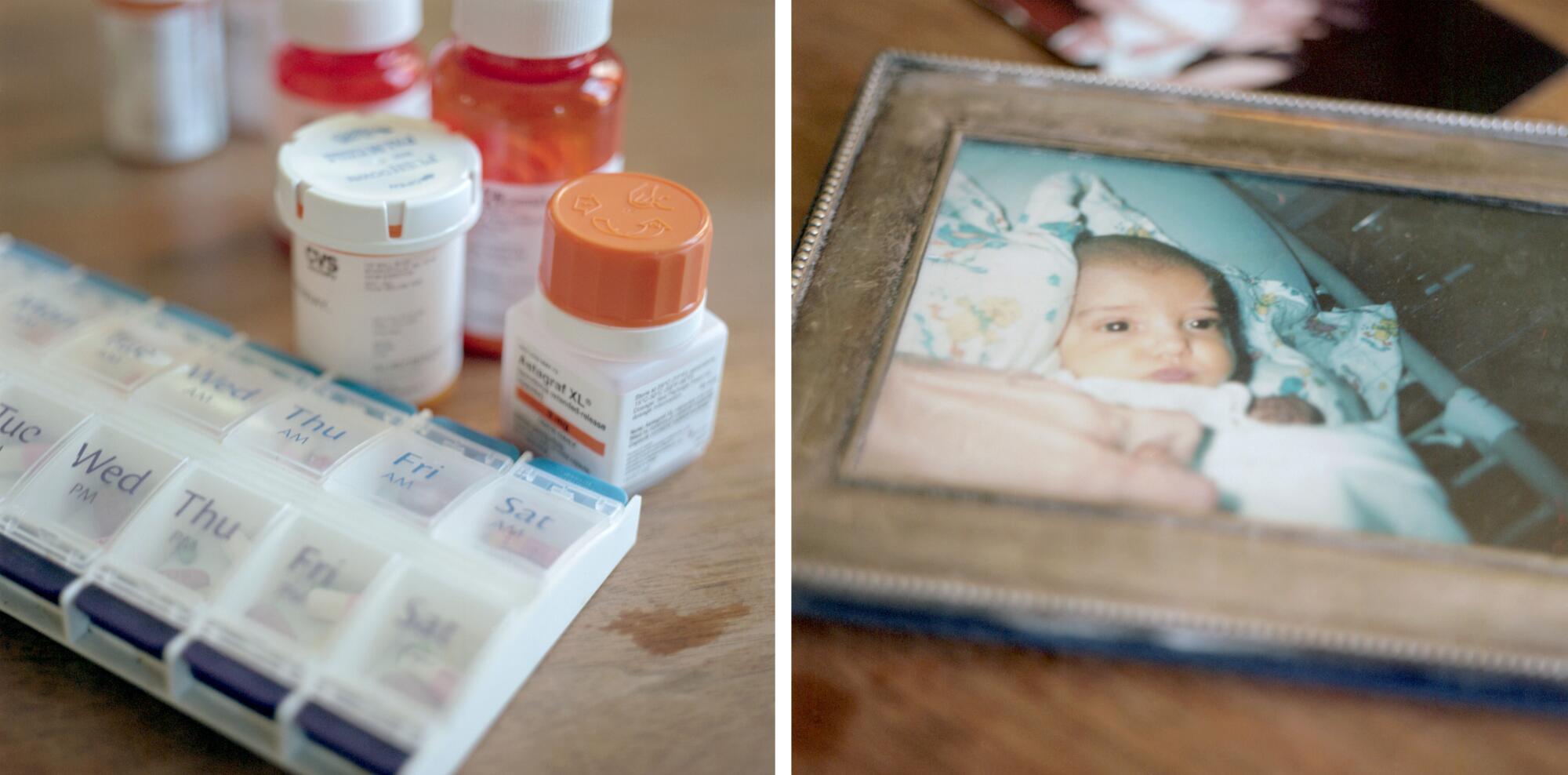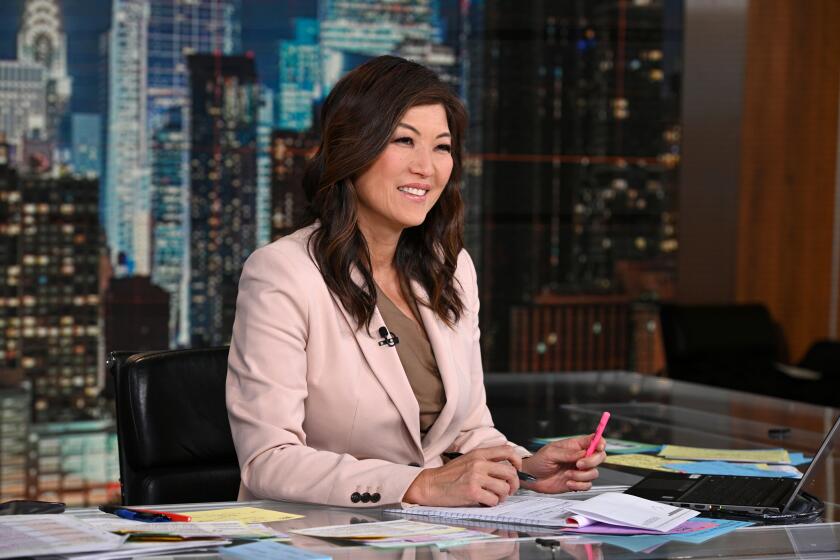- Share via

Catherine Herridge, senior investigative correspondent for CBS News, was working at Fox News when she gave birth to her youngest son, Peter, in December 2005. Within weeks he was diagnosed with biliary atresia, a blockage in the ducts that carry bile from the liver to the gallbladder, a rare form of liver disease only seen in infants. Peter’s only chance of survival was an organ transplant.
When Herridge went to her boss, the late Roger Ailes, who was chief executive of Fox News at the time, to inform him of the situation, his first question was: “Where can I buy a liver?”
“I told him it just doesn’t work that way,” Herridge recalled during a recent interview from her CBS News office in Washington. She explained she was waiting for the Memorial Day holiday weekend, when organs become more available due to the typically high number of motor vehicle crash victims.
Nothing turned up, however, and in June 2006, Herridge became a donor herself. She gave 20% of her liver to Peter when he was 6 months old. It took two years for her to feel like herself again following the operation when she returned to covering intelligence and homeland security.
Joe Scarborough, Mika Brzezinski and Willie Geist, the longest-running morning team on network TV, will be waking up the West Coast by filling the 6 a.m. Pacific slot.
Now 16, Peter has grown to 5 feet 10 and gained a keen interest in skateboarding and girls. He has his first part-time job, bagging groceries at an Army base supermarket in Maryland.
Still, Peter requires rigorous medical management and monitoring of his medications as he enters adulthood. He needs monthly bloodwork and occasional biopsies. He makes annual visits to UPMC Children’s Hospital of Pittsburgh, where the surgery was performed.
The vigilance required in raising a child who is immunosuppressed has permeated Herridge’s work and intensified her commitment to holding the U.S. military accountable in her national security reporting. Two of her investigative stories revealed the plight of military veterans denied medical benefits from the government and delivered policy-changing results in 2021.
“After coming through the transplant and COVID,” Herridge said, “there is not a person or an institution that I would not take on for Peter, and that has carried over into my reporting.”


Herridge and her husband, retired Lt. Col. John Hayes, are determined to let Peter have an active life, even though any infectious illness poses a potentially fatal threat. “Since the transplant, we all take off our shoes when we walk in the door and wash our hands,” she said. “I know it sounds crazy, but it does more to cut down on infection than almost anything else. My job is to keep him as healthy as possible for as long as possible because he’s probably going to need a second transplant at some point.”
When the pandemic hit in early 2020, her anxiety intensified. “After Peter nearly died as a baby and had a transplant, we made a decision that we were going to let him live freely,” Herridge said. “He was not going to be put into some bubble. And that was really tested by COVID.”
Herridge’s toughest decision was allowing Peter to return to public school in Washington, D.C., last September at a time when his immunosuppression level was at its highest since the transplant.
“I wrestled with it,” Herridge said. “I lay in bed at night thinking, ‘God, is this going to be the thing that takes him out?’”
Peter contracted the virus within three weeks of returning to the classroom. He suffered mild symptoms and recovered. For a relieved Herridge, every triumph is followed by reflection.
“When you walk with death with someone that you love and you come through it, you see a sweetness in life afterwards that you would never appreciate,” Herridge said. “And you see a clarity of purpose that you would never have realized.”
Born and raised in Toronto, Herridge, 57, started her career at ABC News in London after graduating from Harvard and Columbia Journalism School. She spent nearly 22 years at Fox News, where she was a respected correspondent delivering straight-ahead accounts and investigative stories in a confident, no-nonsense style from the Pentagon, the Department of Justice and war zones in the Middle East and Europe. While at the network, she won the Tex McCrary Award for Journalism presented by the Congressional Medal of Honor Society.
As Fox News leaned more into right-leaning opinion in prime time, where Herridge often appeared, she believed her work was no longer having the kind of impact she wanted. Her frustration led to her joining CBS in October 2019, where she is now a fixture on “CBS Mornings” and “CBS Evening News With Norah O’Donnell.”
“We did a lot of great reporting at Fox News,” said Herridge. “But you want to be known as someone who is a newsmaker, not a fact-checker. The news space was getting smaller and smaller, and I was getting exhausted by it.”

Herridge’s decision to make a career move while in her mid-50s, an age when on-air opportunities for women in TV diminish, felt like a risk.
Those concerns fell away when Herridge met with Susan Zirinsky, then president of CBS News, who recognized her decades of experience as a plus, especially when covering the Pentagon. Correspondents on the beat include CNN’s Barbara Starr and CBS’ David Martin, both in their 70s, while ABC’s Martha Raddatz is 69. All have had lengthy tenures.
“In the national security space, it really can take at least a decade to build a reputation and start to make contacts,” Herridge said. “You have to build relationships of trust.”
Herridge acknowledged how she also had to win the trust of some of her colleagues at CBS News, who were wary of having a Fox News veteran in their ranks. “I think you were always fighting the prejudice against Fox as a news organization,” said Herridge.
Any questions about Herridge’s objectivity likely faded when her questions irritated then-President Trump in an interview conducted during the 2020 presidential campaign. CBS News insiders now say they watch her with the anticipation of seeing a report that could make a difference in the lives of those she is covering.
“She has a brain that bores on the flawed details in something that everyone accepts and drives by,” said Zirinsky, who currently oversees a documentary production unit at CBS News. “It’s something not everybody possesses, but she’s like a female AWAC plane,” referring to the airborne warning and control system. “She’s a great synthesizer of facts and she has a heart.”
The longest tenured Asian American journalist on network TV has some stories of her own.
After arriving at CBS, Herridge put a spotlight on a growing number of U.S. military troops who suffered serious ailments linked to a toxic base in Uzbekistan where they served between 2001 and 2005. Her reporting is credited for bringing attention to the issue and led to an executive order from Trump during his last day in office that provided previously denied medical care for the affected troops.
When Herridge learned of the order, she placed a call to one of the veterans once stationed at the Karshi-Khanabad base, known as K2, who served as a source for the story.
“He said, ‘I have to pull over to the side of the road because I’m crying so hard I can’t see what I’m doing,’” Herridge recalled. “And I cried with him.”
Herridge also uncovered the extent of the injuries suffered by U.S. troops from Iran’s January 2020 ballistic missile strike on the Al Asad Airbase in Iraq, in retaliation for the killing of Qassem Suleimani, a top Iranian military official. The U.S. government played down the severity of the attack’s impact so tensions with Iran did not escalate. Trump described the injuries as “headaches.”
But as a result, troops who suffered brain injuries were denied Purple Hearts and the medical benefits that come with them. Herridge’s reports prompted the Army’s Human Resources Command to approve the awards in December 2021.
“I think we were very close to a conflict with Iran than the public ever recognized,” Herridge said. “But that should have never prevented the last administration from recognizing the injuries of these soldiers. It should not have gone on for two years.”
Back at home, Herridge is getting Peter ready for special education instruction to make up for the school time lost during the pandemic. It has provided a perspective on what many parents coped with during the pandemic.
“COVID was crushing for these children,” she said. “And Peter needs more help today than he did two years ago. My exposure to the public school system, special education, the bureaucracy — pretty soon I’m going to want to turn my investigative lens on that.”
Herridge’s sons Peter and James, a 17-year-old high school junior, have heard it before. As she put it, “My kids always say, ‘Don’t make mama mad — she’ll investigate you.’”

More to Read
Inside the business of entertainment
The Wide Shot brings you news, analysis and insights on everything from streaming wars to production — and what it all means for the future.
You may occasionally receive promotional content from the Los Angeles Times.













